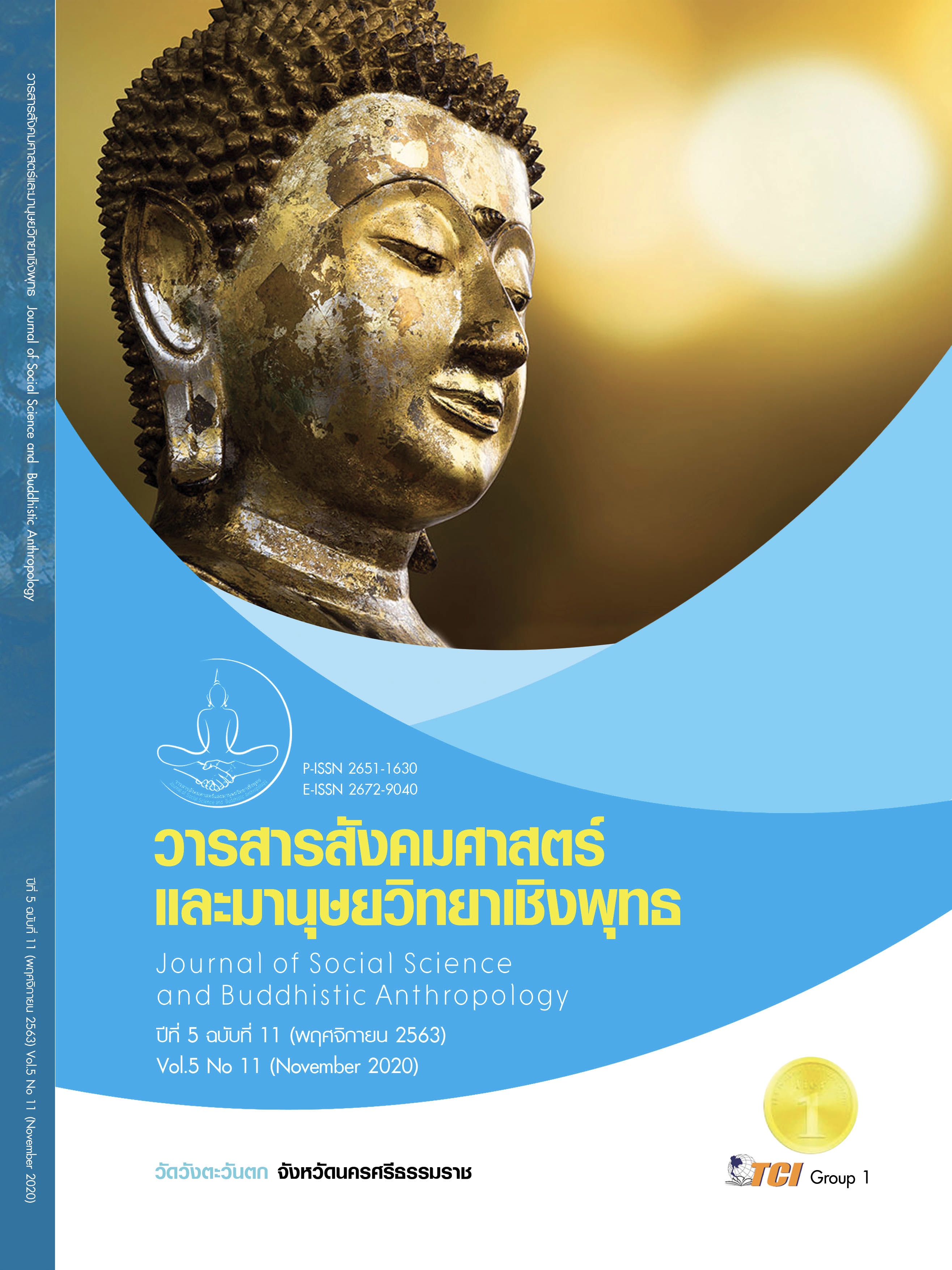THE DEVELOPMENT OF LEARNING SKILLS FOR 21st THE CENTURY IN ROOMPOTHONG DHAMMAWIT SCHOOL
Keywords:
The Development, Learning Skills in the 21st Century, Rompho Thongthamawit School, Buddhist Scripture SchoolAbstract
The objectives of this research article were: to study the results of the changes from the research operations at each stage knowledge emerging learning experiences that occur, and to present the development of learning skills in the 21st century Romphothongthamwit School. a participatory workshop research methodology. specific audiences. select specific the criteria for the necessary requirements to develop are: teachers and staff 10 people. secondary school students 1st - 6th 41 people, including 51 people. research tools include open-ended queries, scaling queries, observation, interviews, and audit or log. data collection from operations, activities in 2 10 - phase cycles, and data analysis are used periodically, both qualitatively and quantitatively. presented in a critical concept. The results showed that: changes new knowledge and learning experience is the result of the transition from teacher - centered to student -centered. Turn teaching into learning management change from focusing content to focused learning process switch from emphasis to knowledge to focus on skill training. change the role of a teacher whose teaching role is a non-teaching teacher. building a community of learning, creating an atmosphere the selection of modern technology, good interaction, and 21st century learning skills development results showed a relative composition between learners. Instructors the key parts that result in the development are the strategies for teaching or learning management, depending on the purpose of the activity. subject content, time and audience (learners)
References
พระมหาธีรเพชร ธีรเวที. (2558). การสังเคราะห์รูปแบบการบริหารงานวิชาการโรงเรียนพระปริยัติธรรมแผนกสามัญศึกษา. วารสารวิชาการคณะบริหารธุรกิจ มหาวิทยาลัยเทคโนโลยีราชมงคลธัญบุรี, 10(1), 19-32.
พิมพันธ์ เดชะคุปต์. (2559). การจัดการเรียนรู้ในศตวรรษที่ 21. (พิมพ์ครั้งที่ 4). กรุงเทพมหานคร: โรงพิมพ์แห่งจุฬาลงกรณ์มหาวิทยาลัย.
วรรณดี สุทธินรากร. (2560). การวิจัยเชิงปฏิบัติการแบบมีส่วนร่วม และกระบวนการทางสำนึก. (พิมพ์ครั้งที่ 2). กรุงเทพมหานคร: สยามปริทัศน์.
วิโรจน์ สารรัตนะ. (2556). กระบวนทัศน์ใหม่ทางการศึกษากรณีทัศนะต่อการศึกษาศตวรรษที่ 21. กรุงเทพมหานคร: ทิพยวิสุทธิ์.
วิโรจน์ สารรัตนะ. (2558). การวิจัยทางการบริหารการศึกษา: แนวคิดและแนวปฏิบัติ. (พิมพ์ครั้งที่ 4). กรุงเทพมหานคร: ทิพย์วิสุทธิ์.
ศิริวรรณ ฉัตรมณีรุ่งเรือง และวรางคนา ทองนพคุณ. (2557). ทักษะแห่งศตวรรษที่ 21 ความท้าทายอนาคต. เรียกใช้เมื่อ 19 กันยายน 2560 จาก http://www.qlf.or.th
สำนักงานคณะกรรมการการศึกษาขั้นพื้นฐาน. (2558). แนวทางจัดการเรียนรู้ในศตวรรษที่ 21 (21stCentury Skills). กรุงเทพมหานคร: สำนักบริหารงานการมัธยมศึกษาตอนปลาย.
สำนักงานเลขาธิการสภาการศึกษา. (2557). บทวิเคราะห์การศึกษาไทยในโลกศตวรรษที่ 21. กรุงเทพมหานคร: สำนักงานเลขาธิการสภาการศึกษา.
สุคนธ์ สิทธพานนท์. (2558). การจัดการเรียนรู้ของครูยุคใหม่เพื่อพัฒนาทักษะของผู้เรียนในศตวรรษที่ 21. กรุงเทพมหานคร: ห้างหุ้นส่วนจำกัด 9119 เทคนิคพริ้นติ้ง.
Churches, A. (2008). 21st Century Pedagogy. Retrieved January 30, 2017, from http://edorigami.wikispaces.com/21st+Century+Pedagogy
Creswell, J. W. (2008). Educational research: Planning, conducting, and evaluating quantitative and qualitative research. (3rd ed). New Jersey: Merrill Prentice Hall.
Heick, T. (2012). 10 Characteristics of Highly Effective Learning Environment. Retrieved February 6, 2017, from http://www.teachthought.com/learning/10-characteristics
Heick, T.(2013). 5 Characteristics Of Global Learning. Retrieved February 6, 2017, from http://www.teachthought.com/terry-heick/5-characteristics-of-global-learning/
James, E. A. et al. (2008). Participatory action research for educational leadership :Using data-driven decision making to improve schools. Thousand Oaks, CA: Sage.
Kamat. (2012). New trends in education for 21st Century. Retrieved February 5, 2017, from http://aview.in/allevents/new-trends-in-education-for-21-century
Likert, R. (1967). The method of constructing and attitude scale, reading in attitude theory and measurement. New York: Wiley & Son.
Mills, G. E. (2007). Action research: A Guide for the teacher researcher. (3nd ed.). New Jersey: Merrill Prentice Hall.
Partnership for 21st Century Skills. (2009). P21 Framework Definitions. Retrieved February 6, 2017, from http://www.p21.org/storage/documents/P21_Framework_Definitions.pdf
Pontefract, D. (2011). ABC-The 21st Century Learning Model. Retrieved February 5, 2017, from http://www.danpontefract.com/abc-%E2%80%93-the-21st-century-learning-model/
Prensky, M. (2001). ABC-The 21st Century Learning Model. Retrieved February 6, 2017, from http://www.marcprensky.com/writing/PrenskyPart1.pdf
Quixley, S. (2008). Participatory action research: A brief outline of the concept. Taskforce: Canberra.
Sahin, M. C. (2009). Instructional Design Principles for 21st Century Learning Skills. Procedia Soc. Behav. Sci. Procedia – Social and Behavioral Sciences, 1(1), 1464 – 1468.
Seymour-Rolls & Hughes. (2000). Particiaptory action research: Getting job done. Retrieved January 20, 2017, from http://www2.fhs.usyd.edu.au/arow/o/m01/
The Victorian Council of School Organizations Inc. (2012). A 21st Century Curriculum – Discussion Paper. Retrieved February 5, 2017, from http://www.viccso.org.au/big-ideas/a-21st-century-curriculum
Waugh. (2011). 21st Century Classroom. Retrieved February 6, 2017, from http://mswaughsclass.blogspot.com/2011/04/21st-century-classroom.html









